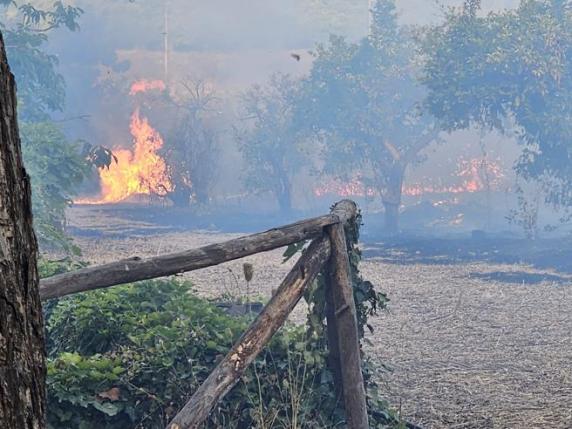Drought and water shortages are compounding. Farmers and producers in various parts of the island are complaining about the lack of irrigation water.

Sicily is burning, a sad story that repeats itself. The damage from the fires is extensive and growing, sending thousands of hectares up in smoke, and many areas have been devastated. Not only are there disruptions in several provinces, but there have also been dramatic cases with potential danger to people, with 50 homes evacuated in the Trapani area. In total, according to initial estimates, 2,000 hectares of the island have gone up in smoke during these days of fires. Damage to the economy, agriculture, animals, and nature.
Areas of the Trapani province, made famous by the Rai fiction"Makari," are also on fire. Large areas of Monte Cofano, Custonaci, Makari, San Vito Lo Capo, and the Zingaro Nature Reserve (one of the most important and evocative reserves in the southern Mediterranean) have been hit. In the Nisseno area, the Niscemi cork oak forest has been seriously damaged. Damage has also been reported in the Palermo area (Piana degli Albanesi), in the Enna area, in the Etna area between Biancavilla and Ragalna (134 hectares in smoke and a scout camp was evacuated as a precaution), in the Syracuse area (Cava Grande del Cassibile), and in the Calatino area. The list is very long.
True devastation. The fires have destroyed various areas, Coldiretti states in a statement. What is happening? This week, Sicily has been affected by particularly adverse weather conditions, characterized by extremely high temperatures, strong winds, and weather forecasts that have highlighted a high susceptibility to the ignition and spread of forest and vegetation fires. These factors have led to a significant increase in firefighting operations throughout the region, with approximately 2,000 hectares of forest and vegetation gone up in smoke and approximately 3,000 interventions carried out from July 21 to today, explains the regional commander of the Fire Brigade, Agatino Carrolo.
The Fire Brigade, in synergy with the Forestry Corps and the regional Civil Protection department, put out 380 fires in various parts of the island yesterday alone.
Reserves and forests are burning. The number of forest fires is striking, 1,500 in one month. Legambiente Sicilia is raising a new alarm: Our priceless heritage of biodiversity and the hope for a future based on beauty are burning. And at this moment, as the damage assessment begins, the emergency is unfortunately not over yet, fueled by high temperatures and the worsening climate crisis. Legambiente Sicilia believes it is necessary to fully enforce existing regulations and introduce new, more radical tools. Furthermore, we must strengthen both territorial protection and control, including the use of law enforcement and the army in the event of weather warnings, and the equipment and personnel responsible for extinguishing fires, to intervene more quickly.
Sicily is once again facing a fire emergency. Many farmers, producers, ranchers, trade unions, and industry associations are lamenting the lack of policies and strategies to combat fires. We can no longer stand by idly and watch this disaster unfold," declared Filippo Scivoli, president of Cna Sicilia, and Piero Giglione, secretary."The fires are destroying hectares of forests, crops, and businesses, causing incalculable damage to the ecosystem and the economy of the affected areas. We urgently call for the activation of a regional emergency protocol involving all institutional actors, law enforcement, volunteers, and industry associations to effectively prevent and combat this scourge. Criticism of the center-right regional government led by President Schifani is also coming from the opposition, who lament the lack of a strategic planning and concrete and effective intervention plan. Schifani replies that these are unfair attacks and claims to have done everything possible, speaking of a prompt response.
Further objective and worrying data emerge from Legambiente's report"Italy in Smoke": Sicily is already in the black spot in 2025, with 16,938 hectares having gone up in smoke due to the multiplicity of fires. This situation is compounded by drought and a water crisis. Farmers and producers in various areas of the island are complaining about the lack of irrigation water. And there is no shortage of new paradoxical cases even where there is water: It seems like a joke, but it really happens that in the Ogliastro dam there is enough water for irrigation but it cannot be adequately distributed to the agricultural lands because the pipes burst, is the bitter observation of Giosuè Catania, president of CIA Sicilia Orientale. After two years of persistent drought that has brought to its knees both structurally and productively many of the agricultural companies in the area, here comes the ancestral problem of maintenance, the serious structural deficiencies of many reservoirs and the inefficiency of the water pipes – comments Giosuè Catania-. The drama being experienced in the Ogliastro dam area surpasses any human consideration which, without wishing to proceed with any accusatory note, highlights the state of dilapidation of the main transport networks which are old and obsolete and subject to collapses that compromise their functionality. Catania adds: We hope that full distribution can be restored as soon as possible, proceeding with decisive maintenance interventions – Catania emphasizes – because today we are still losing 50% of our water. And we remain hopeful that the Pietrarossa reservoir under construction can leave behind a past of mismanagement, waste, and political shortsightedness and look to the future with more optimism. The economic losses for hundreds of producers in the Catania Plain are inevitable and significant across all agricultural sectors . And there is concern that new strong heat waves, which are occurring with increasing regularity due to climate change, will cause further damage. Farmers, breeders, and producers are calling for urgent interventions from both the regional and national governments. They add that Sicily is a European case, not a local one.

